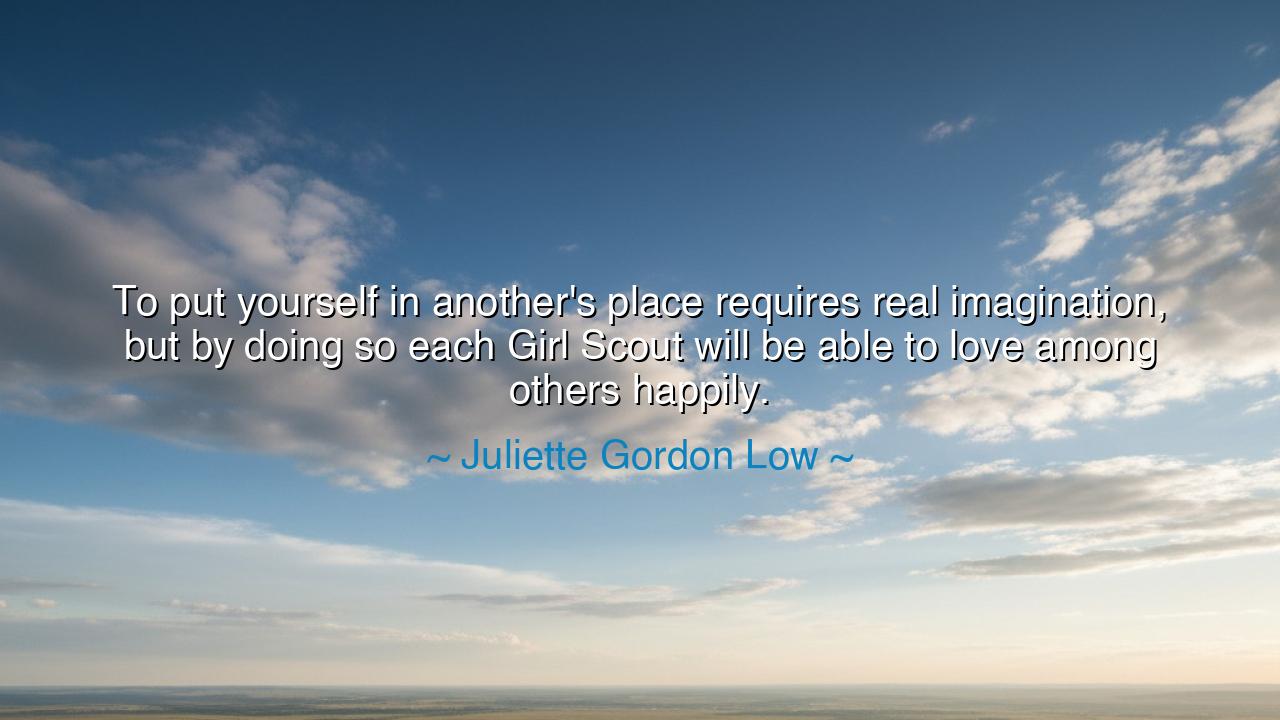
To put yourself in another's place requires real imagination, but
To put yourself in another's place requires real imagination, but by doing so each Girl Scout will be able to love among others happily.






The Art of the Heart: On Imagination, Empathy, and the Joy of Understanding
Hear, O child of kindness, the words of Juliette Gordon Low, the noble founder of the Girl Scouts and teacher of compassion: “To put yourself in another’s place requires real imagination, but by doing so each Girl Scout will be able to love among others happily.” In this simple truth lies the key to peace among humankind — the power of imagination joined with empathy. For what she teaches is no small art, but the highest act of love: the ability to see through another’s eyes, to feel as another feels, to dwell, if only for a moment, within another’s soul.
Juliette Gordon Low was not merely a leader of youth, but a weaver of hearts. She understood that the greatness of a person does not rest in conquest or intellect, but in the ability to understand and care for others. When she founded the Girl Scouts in 1912, she envisioned a community of young women who would not only learn skills of survival and service, but who would also cultivate that inner strength of spirit which allows one to live joyfully among others. To her, this was the true education — the education of the heart.
Her words speak of imagination not as fantasy or escape, but as the bridge to compassion. To “put yourself in another’s place,” she says, requires more than sympathy — it requires creative vision, the willingness to step outside the walls of self and enter into another’s world. This is not an easy task. It calls for courage, humility, and above all, the imaginative power to see life through unfamiliar eyes. Yet those who cultivate this art find a treasure that cannot be measured: the ability to love deeply, to forgive easily, and to live in harmony with all creation.
Consider the story of Florence Nightingale, who, like Juliette Low, was a woman of great compassion and courage. In the midst of the Crimean War, surrounded by suffering and filth, she did not turn away. Instead, she imagined herself in the place of the wounded soldiers — frightened, cold, and dying far from home. From that vision of empathy came her calling: to heal, to comfort, to reform the ways of medicine. It was not duty alone that moved her, but imagination — the sacred ability to see another’s pain as her own. And through that vision, she brought light into the world’s darkest places.
So too does Juliette Low remind us that empathy, when guided by imagination, transforms how we live among one another. The one who can imagine another’s burden learns patience; the one who can feel another’s joy learns generosity. In a world torn by division, this imaginative empathy is no mere kindness — it is salvation. To imagine the fears of the stranger, the hopes of the outcast, the dreams of the child — this is to become truly human. For love that is rooted in imagination does not judge, it understands; it does not compete, it uplifts.
Yet the task is not easy. It is simpler to live enclosed within the fortress of the self, to measure others by one’s own experience, to demand understanding before offering it. But as Juliette Low teaches, imagination breaks down these walls. It is the power by which we step beyond the narrow boundaries of “I” and enter the vast kingdom of “we.” This, she says, is the secret to happiness — not found in isolation or success, but in the shared joy of living among others in love. The person who can imagine another’s struggle will never be truly lonely, for their heart will be large enough to embrace the world.
So, O listener of light, let this teaching dwell in your spirit: practice imagination not only in art, but in compassion. When you meet anger, imagine the pain beneath it. When you see joy, imagine the journey that led there. When you encounter difference, imagine what beauty lies beyond your own knowing. For every act of imagination in service of empathy brings you closer to wisdom, closer to peace, closer to the divine harmony that unites all living beings.
Thus, as Juliette Gordon Low proclaimed, the path to happiness and love among others begins not with rules, but with imagination — that sacred faculty that allows the heart to see what the eyes cannot. The one who can imagine another’s sorrow will bring healing; the one who can imagine another’s joy will bring celebration. Therefore, cultivate this noble art of the heart. Let your imagination become the mirror of compassion, and your compassion the fountain of joy. For in seeing through the eyes of another, you will at last see the world as it was meant to be — one great family, bound together by the golden thread of understanding.






AAdministratorAdministrator
Welcome, honored guests. Please leave a comment, we will respond soon